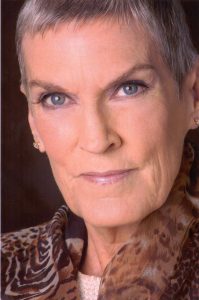
Her current Don't  Tell Mama show could be the one Sally Darling was truly born to do. Back in the 1970s she created four revues combining the songs of Noël Coward and Cole Porter. In her more recent cabaret shows, Darling has teased her audiences with generous samplings of Coward's vast body of work. But now she's gone "Totally Noël…." And about time, too. It's not just her sly cuteness and delicious diction that fuse her symbiosis with The Master, as he was often termed from the 1920s on, mostly because of his multifaceted prolificacy. (It was a knock turned on its head as high praise, he claimed: "jack of all trades, master of none.") Darling and Coward's legacy also overlap in finding a sense of fun even in serious subjects, and looking askew at life in all its manifestations. Their shared subtext seems to be a need to get on with life no matter what it hands you.
Tell Mama show could be the one Sally Darling was truly born to do. Back in the 1970s she created four revues combining the songs of Noël Coward and Cole Porter. In her more recent cabaret shows, Darling has teased her audiences with generous samplings of Coward's vast body of work. But now she's gone "Totally Noël…." And about time, too. It's not just her sly cuteness and delicious diction that fuse her symbiosis with The Master, as he was often termed from the 1920s on, mostly because of his multifaceted prolificacy. (It was a knock turned on its head as high praise, he claimed: "jack of all trades, master of none.") Darling and Coward's legacy also overlap in finding a sense of fun even in serious subjects, and looking askew at life in all its manifestations. Their shared subtext seems to be a need to get on with life no matter what it hands you.
Slightly eccentric from the outset, Darling opens with two serious compositions, "Nevermore" and "Let's Say Goodbye," then jokes about starting her show with a farewell song. Given Coward's enormous output, it must have been difficult to choose which songs to sing. She dismisses many of the usual suspects early on, with a medley of snippets from many Noël numbers she is not going to sing, including "Someday I'll Find You," "I'll See You Again," "I'll Follow My Secret Heart," and "If Love Were All." Not to worry. Among some relative obscurities are such familiar Coward compositions as the long-undercover expression of homosexual attraction, "Mad About the Boy," the World War II pep talk "London Pride," and "Mad Dogs and Englishmen," Coward's channeling of Gilbert and Sullivan, the preeminent composing team of his youth.
Darling does a double from Sail Away, Coward's penultimate Broadway musical, and the last one for which he wrote music, lyrics, and libretto. While the title song has long been a cabaret staple, it serves her as an anthem for pressing on, regardless. "Bronxville Darby and Joan" is well suited to Darling's ironic side, as it's about a long-married couple who hate each other but are presumed by their fellow shipboard passengers to be models of extended matrimonial bliss. This number, like "London Pride," is done as a duet with musical director Matthew Martin Ward, Darling's crucial ally as her sole accompaniment on piano and masterful arranger. This time out, he has a larger, even more effective, vocal role than he did in her prior shows. In addition to singing several duets with her—most touchingly "Matelot"—he performs a comic solo, "Uncle Harry," a tale of a missionary surrounded by cannibals that Coward sang to entertain WWII troops. The song ends, inevitably, with "Harry's not a missionary now."
Throughout her hour-long set, Darling nicely provides just enough narration to elucidate each Coward song and its source, as well as what was going on in the wider world during his composing lifetime. I could quibble with her use of "Mrs. Worthington," Coward's classic kiss-off of the stage mother of a wildly unsuitable daughter, as the act's through-line. The broken-up detailing, in the form of a "Mrs. Worthington" verse after every few full songs, listing some of the reasons why Mrs. W. shouldn't put her daughter on the stage, doesn't meld or illuminate the otherwise estimable song list. If a counterintuitive number is really needed to hold it all together, why not "Why Must the Show Go On?" Fortunately, this number is done here in its entirety in one place. I would very much have missed such scrumptious Coward lines as "Let's hope we have no worse to plague us/ Than two shows a night in Las Vegas."
I did miss seeing Darling's take on anything at all from The Girl Who Came to Supper, Coward's last Broadway show. "I'll Remember Her" would have worked well in this show, gender-changing lyrics be damned. Even better, at least one of the four British music hall-ish numbers Tessie O'Shea introduced in the show would have been a welcome addition to an otherwise complete "collaboration" between singer and composer.